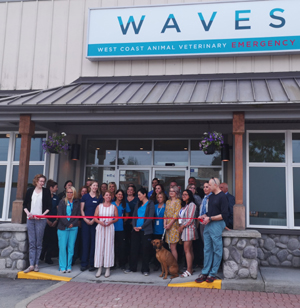
Wednesday July 8, 2020 ~ WEST SHORE and SOOKE
by Meaghan Power ~ West Shore Voice News
The ever-changing Canadian economy during the COVID-19 pandemic has profoundly impacted the operation of businesses, with a significant burden placed on small businesses.
To better understand the challenges and consequences businesses face from a local angle, West Shore Voice News approached a few local businesses in the west shore area. We looked at how the initial impact of COVID-19 on the company, use of the available government economic supports, and the recent process of reopening.
Grocery stores remained open:
As an essential service to everyone in the community, all grocery stores remained open during Phase 1 of the pandemic, when most other businesses were closed and employees either worked from home or were laid off.

At the Quality Foods grocery store in Langford, the team has ensured maximum safety for all employees and customers in the store, says store manager Damon Dubetz.
At the beginning of the first wave of COVID-19 on Vancouver Island in March, Quality Foods saw an increase in online orders and ramped up their delivery service to maintain customer satisfaction.
In the four months now since the beginning of the pandemic, the online service activity for grocery orders has tripled. In-store, it’s been busier too.
For in-store shoppers, masks were readily available, and different safety procedures were set in place. Customers now walk down one-way isles with a 6-foot distance between themselves and others. Signs were created and placed throughout the store to ease the confusion of the “new normal,” and plexiglass barriers were placed at the checkout counters.
Most employees stayed on as the pandemic made its impact. The management team provided records of employment to those who wanted to claim the Canada Emergency Response Benefit (CERB). Three employees stayed home due to pre-existing medical conditions, and two of those are already back to work. The other will be returning soon.
As opposed to shortening their hours of operation, they extended hours specifically for senior shopping. Originally, hours of operation were from 8 am to 10 pm, and now they are from 7 am to 10 pm. Dubetz would like to extend a large thank you to the City of Langford for providing stickers for their floor and both the customers and staff for being accommodating and patient during this time.
Pet care services surged:
Pets are members of the family, and services for their care did not subside during the pandemic.

At the WAVES Veterinary Emergency Hospital — a specialty emergency animal hospital in Langford that opened only last year — they adapted and were considerate to all clients during the pandemic. Richelle Straith, WAVES public relations manager, discussed the hospital’s experience with COVID.
As an essential service, WAVES operated 24/7 during COVID-19. However, they did follow a strict protocol. Clients were not allowed into the building; pets were brought in while clients stayed in the car. Any employees showing symptoms of illness were sent home, and everybody else was wearing complete personal protective equipment (PPE).
No government economic support was used by the business although Straith was off for three months on CERB as public relations was not seen as essential. Overall, their hospital is now 40% busier than usual, as apparently many clinics are closed or operating strictly on appointments. In addition, more pet owners recognize symptoms they may not have seen within their pets initially by staying at home.
Car repairs throughout the pandemic:
Keeping vehicles in good working order — especially for essential workers — was an important service during the peak of the pandemic. But the service rolled out differently at two different repair shops.
At Dumont Tirecraft in Sooke. operations were maintained during COVID-19 at first with shortened hours and fewer business days. For the first three weeks, the Dumont Tirecraft was open from Monday to Thursday from 8:30 am to 5:30 pm, and the reception area was blocked to the public, says shop owner Jason Dumont.
Employees did not take advantage of CERB; however, the company did get on board with government benefits to maintain the shop’s stability during troubling times. In terms of employees, in Phase 1 of the pandemic part-time staff was laid off, and the permanent workers stayed on.
Reduced hours are still in place; however, they are now open for business from Monday to Friday (8:30 am to 5:30 pm). Dumont staff were diligent about their safety procedures and ensured that everything touched by customers was sanitized, all vehicles were clean, and that hand sanitizer and lotion were readily available.

Big O Tires West Shore in View Royal meanwhile faced a different experience with COVID-19. They experienced a sudden downturn in customers. From this, all employees were laid off, and the store was closed for normal operations for five weeks.
Big O Tires West Shore shop owner Don Swindell was in to answer calls. All five employees took on the support of EI and then CERB.
However, in the shop today, Troy Swindell says their recovery is looking up. Hours and days of operation are back to normal (generally 8 to 5, Monday to Saturday), and staff is at 75% capacity, with the exception of those with pre-existing health risks.
Supporting local business:
During this rare and uncertain time, it is essential to support local businesses. Each business interviewed in the West Shore area had a different experience. All businesses all have been heavily impacted by the pandemic, whether through lower customer turnout or economic setbacks related to operational adjustments.
There is a long journey ahead for economic recovery overall in the region. However, the resiliency and commitment to customer satisfaction that these businesses have shown has been greatly appreciated by their customers and community.

===== About the writer:

Meaghan Power is a student journalist with West Shore Voice News (WSVN) this summer. She has keen socioeconomic views that align with the mission and readership of the WSVN publication.
West Shore Voice News under the leadership of Mary Brooke, editor, has covered the COVID-19 pandemic news — health angles and economic impacts — non-stop during the pandemic. The federal government declared journalism as an essential service back in the early phases of COVID-19, and local MP Alistair MacGregor (Cowichan-Malahat-Langford) identified West Shore Voice News in this community.
West Shore Voice News has offered advertising support to many businesses at discount rates (or better!) as part of our commitment to community.




